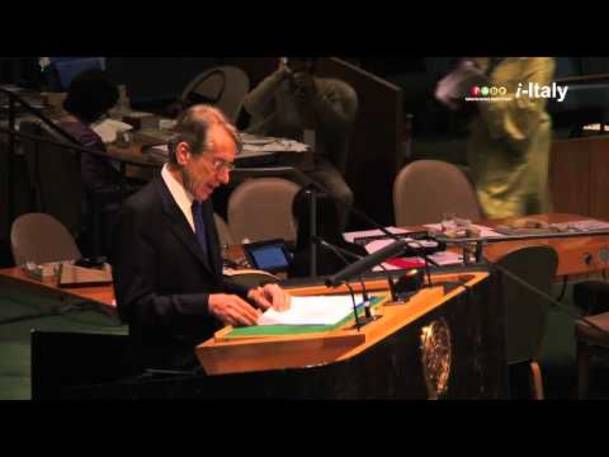


Italian Foreign Affairs Giulio Terzi di Sant’Agata met the press at the United Nations Headquarters in New York, after delivering his speech at the Informal High Level Meeting of the UN General Assembly on "The Role of Member States in Mediation."
Terzi started his press conference with a memory of Justice Giovanni Falcone, killed by the mafia in Capaci (Sicily) exactlytwenty years ago. “Falcone was a key figure in the fight against organized crime and corruption,” the Minister stated, elaborating on the importance of commemorating him at the United Nations: “Today's discussion is very connected with it in terms of values,” Terzi commented.
In his speech at the U.N. General Assembly, Terzi foused on Italy’s position on the role of UN member states in mediation processes. The Minister expressed the Italian government’s concern on viewing mediation as “a principle of volunteerism,” whereas the commitment to this pacified way of solving controversies “needs to be more deeply felt.”
Terzi mentioned conflicts of jurisdiction on subjects such as the interpretation of the law of the sea and international waters, antipiracy and counterterrorism operations, as “issues that should be first of all addressed through mediation, but with honesty, clarity, and with concrete will to contribute to a solution.”
The Minister’s remarks were pointed at the Italy-India controversy over the detainment of two Italian marines, Massimiliano Latorre and Salvatore Girone, charged by the Indian police with the murder of two Indian fishermen they allegedly mistook as pirates last February. The two were engaged in antipiracy operations in international waters, and should therefore be tried in Italy instead of being held prisoners in Kerala, India. “The Jamaica convention on the law of the sea is very clear,” Terzi stated, adding that the applicable jurisdiction in high waters is that of the nation to whi. “On this very unfortunate situation we expect that a quick solution will be facilitated by the Indian authorities, with which we are constantly in contact.”
Italy has recently recalled its ambassador to India Giacomo Sanfelice for consultations: “There has been a very important meeting yesterday that I could not attend,” Terzi told the press, “we are examining aspects of the international law.”
Terzi also auspicated that the international community will keep devoting energies in countering piracy: “This episode has already had a very negative effect on antipiracy efforts, and it should not constitute a blockage on peace and antipiracy operations.”
Answering to the journalists’ questions, Terzi also described the Monti government’s position on the Syrian crisis saying that Italy is “concentrating efforts on the Annan plan, that we accept without any mental or political reservation,” and adding that at the end of the 90 days period of time the plan comprises “we will have to discuss very seriously in the Security Council about the outcome of this engagement.” Whether there will be no satisfactory outcome, Terzi declared: “I guess the Security Council should give a pronouncement with stronger resolutions.”
On the Eurozone’s condition, Terzi declared the Italian government has deemed the austerity measures “essential to address the present crisis ” since when the European Fiscal Compact was adopted, “but that from then on,” he added, “the focus should switch to growth measures.”
“In Italy we are profoundly convinced that the agenda for growth is now the highest priority and we are confident that proposals will be on the table of the extraordinary European council tonight,” Terzi said.
(F.G.)
Source URL: http://test.casaitaliananyu.org/magazine/focus/facts-stories/article/role-member-states-in-mediation
Links
[1] http://test.casaitaliananyu.org/files/un-giulio-terzi-role-member-states-mediation